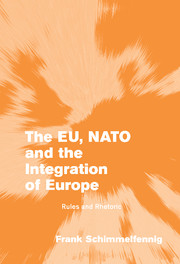Book contents
- Frontmatter
- Contents
- List of figures
- List of tables
- Acknowledgments
- List of abbreviations
- Introduction
- PART I Security, power or welfare? Eastern enlargement in a rationalist perspective
- 1 Rationalist institutionalism and the enlargement of regional organizations
- 2 NATO enlargement
- 3 EU enlargement
- Conclusion: the rationalist puzzle of Eastern enlargement
- PART II Expanding the Western community of liberal values and norms: Eastern enlargement in a sociological perspective
- PART III Association instead of membership: preferences and bargaining power in Eastern enlargement
- PART IV From association to membership: rhetorical action in Eastern enlargement
- Strategic action in international community: concluding remarks
- Appendix (Interviews)
- List of references
- Index
1 - Rationalist institutionalism and the enlargement of regional organizations
Published online by Cambridge University Press: 22 September 2009
- Frontmatter
- Contents
- List of figures
- List of tables
- Acknowledgments
- List of abbreviations
- Introduction
- PART I Security, power or welfare? Eastern enlargement in a rationalist perspective
- 1 Rationalist institutionalism and the enlargement of regional organizations
- 2 NATO enlargement
- 3 EU enlargement
- Conclusion: the rationalist puzzle of Eastern enlargement
- PART II Expanding the Western community of liberal values and norms: Eastern enlargement in a sociological perspective
- PART III Association instead of membership: preferences and bargaining power in Eastern enlargement
- PART IV From association to membership: rhetorical action in Eastern enlargement
- Strategic action in international community: concluding remarks
- Appendix (Interviews)
- List of references
- Index
Summary
Rationalist premises
Rationalist approaches to the study of international relations and international institutions share the premises of individualism, state-centrism, materialism, egoism and instrumentalism:
Individualism. Rationalist theories belong to the class of ontologically individualist theories which treat the individual actor (and not social structures) as the “ultimate source of social patterns” (Alexander and Giesen 1987: 13). Rationalist explanations of social interaction and its collective outcomes start with the actors whose identities, interests, and preferences they take as given and fairly stable over time.
State-centrism. IR rationalism differs from the individualist orthodoxy, however, in that it regards the state, a corporate actor, and not the individual, as the central actor in international politics. In a rationalist framework, this is not problematic as long as the corporate actor has a unitary will, a unitary behavior, and a degree of autonomy. These conditions are covered by the state-as-unitary-actor assumption commonly held by rationalist theories in International Relations.
Materialism. Rationalist institutionalism in IR conceptualizes the international environment as an anarchical and technical environment characterized by the absence of hierarchical authority structures and by the predominance of material structures like the distribution of power and wealth. These material conditions are the most important explanatory factors for the processes and outcomes in international relations. The premise of materialism does not exclude that social norms or rules develop in the international system and effectively constrain states. After all, we are dealing with rationalist theories of international institutions.
- Type
- Chapter
- Information
- The EU, NATO and the Integration of EuropeRules and Rhetoric, pp. 18 - 36Publisher: Cambridge University PressPrint publication year: 2003



